Our website is supported by our users. We sometimes earn money when you click an affiliate link and make a purchase. This is at no extra cost to you and helps us to create quality content. Thank you for your support. For all that have shown us such wonderful support, we thank you from the bottom of our hearts!
The Miniature Schnauzer is a breed with a big personality packed into a compact frame.
Originating from Germany, this breed carries the distinct Schnauzer long beard and a wiry coat, showcasing its unique terrier heritage.
Often sought after as pets due to their manageable size and family-friendly nature, Miniature Schnauzers are small dogs that serve as vigilant companions with a fearless heart.
They are recognized for their intelligence and are relatively easy to train, making them suitable for both novice and experienced pet parents.

If you’re considering adding a Miniature Schnauzer to your family, it’s beneficial to understand their needs and characteristics.
This sturdy terrier breed requires regular grooming to maintain their distinctive look and to prevent matting.
Healthwise, they’re a generally hardy breed, but like all dogs, they do have specific health issues to which they may be predisposed.
Owners should be aware of these potential concerns to ensure their furry friend leads a happy and healthy life.
Key Takeaways
- Mini Schnauzers are a spirited and loyal terrier breed from Germany.
- This breed requires regular grooming and is known for its intelligence and trainability.
- Prospective owners should be aware of the breed’s specific health needs.
History of the Miniature Schnauzer
The Miniature Schnauzer, a breed distinguished by its distinctive beard and eyebrows, has origins deeply rooted in Germany.
This breed was developed from larger Standard Schnauzers and is believed to have been influenced by smaller breeds like the Affenpinscher and possibly breeds from the terrier group.
Timeline of Development:
- 1888: The first recorded Miniature Schnauzer, a black female called Findel in the late 19th century.
- 1890s: The breed appears following the establishment of the oldest German Kennel Club.
- Early 20th Century: Miniature Schnauzers are shown in dog shows as a distinct type from the Standard Schnauzer.
You might find it fascinating how Miniature Schnauzers have made their mark in various regions.
- United States:
- 1924: The breed finds its way to the U.S. with the import of four dogs from Germany.
- 1926: Recognition as a separate breed by the American Kennel Club.
- The American Miniature Schnauzer Club becomes a pivotal figure in maintaining the breed’s standards.
- United Kingdom:
- 1928: Miniature Schnauzers are introduced and quickly gain popularity.
Your appreciation for the Miniature Schnauzer may deepen knowing that they are not just pets but a historical breed with a rich and traceable lineage, reinforcing their place in the terrier group despite their unique heritage.
For more details on the breed’s arrival and establishment in America, a visit to the American Miniature Schnauzer Club may offer an insightful expansion of your knowledge.
If you’re curious about the breed’s earlier days in Germany, more information can be found on their early showings.
Physical Characteristics of the Miniature Schnauzer
The Miniature Schnauzer stands as a robust, sturdily built small dog known for its distinctive beard and wiry coat.
You’ll find this breed to exhibit a range of coat colors and don a double coat that requires regular grooming.
Height Male
Male Miniature Schnauzers generally measure about 12 to 14 inches at the withers.
Height Female
Female Miniature Schnauzers tend to be slightly shorter, typically standing 11 to 13 inches tall.
Weight Male
A healthy male Miniature Schnauzer usually weighs between 11 to 18 pounds.
Weight Female
Female Miniature Schnauzers are often lighter with an ideal weight range of 10 to 15 pounds.
Eye Colors
Your Miniature Schnauzer’s eyes will most likely be dark brown in color, complementing their keen and intelligent expression.
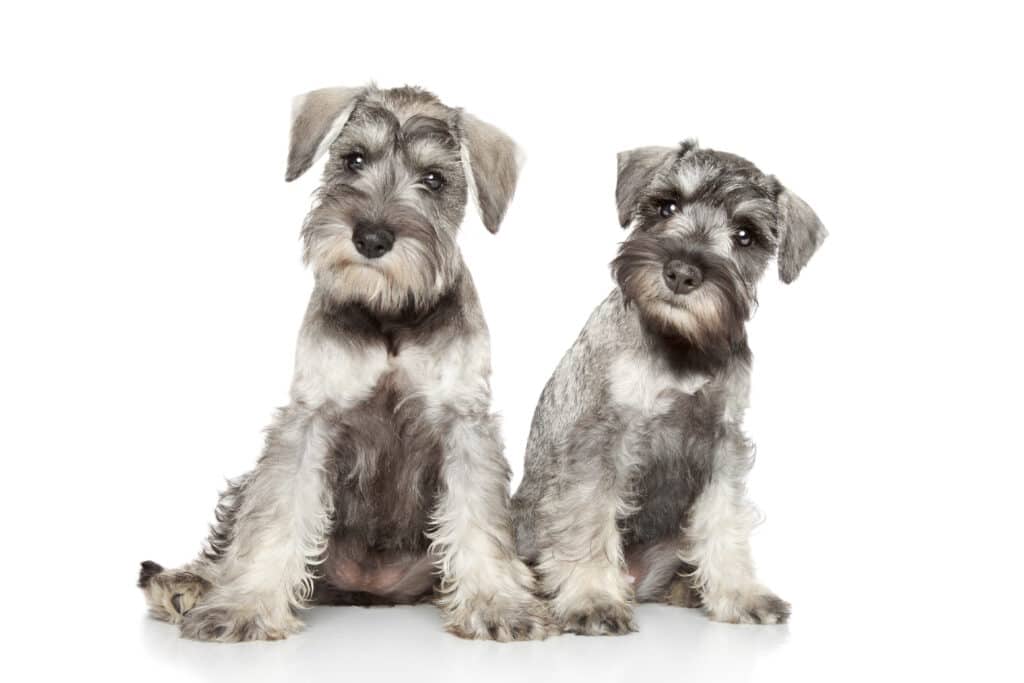
Coat Colors
You will find the Miniature Schnauzer in three AKC-recognized coat colors: black and silver, salt and pepper, and solid black.
Coat Types
Their distinctive double coat consists of a soft undercoat and a harsh, wiry outer coat, with the latter requiring regular grooming to maintain its characteristic appearance.
Life Expectancy
Typical life expectancy for a Miniature Schnauzer spans about 12 to 15 years, with proper care often leading to a full and healthy lifespan.
Temperament & Training of the Miniature Schnauzer
Temperament:
Miniature Schnauzers are known for their friendly and playful nature, often making them excellent family pets.
They exhibit an alert demeanor, showing eagerness and intelligence in their expressive faces.
As sturdy and feisty little dogs, they have a noticeable level of energy and playfulness that requires regular exercise to maintain a happy state.
Their ability to adapt to various living conditions makes good for apartment dwellers; however, they thrive best when given enough space to channel their energy constructively.
- Friendly: Approachable and affectionate with family.
- Playful: Enjoys engaging in games and playtime.
- Alert: Makes a competent watchdog due to vigilance.
Training:
In training your Miniature Schnauzer, you’ll find their intelligence and eagerness to please make them responsive to obedience training.
Starting this process early is essential, focusing on positive reinforcement to guide their behavior.
Because they are a working breed, they excel in agility and other dog sports, which provide both physical and mental stimulation.
- Smart: Capable of learning a wide range of commands.
- Agility: May excel in agility courses that test speed and finesse.
- Obedience: Respond well to consistent, positive training methods.
Regular engagement in exercises and mental stimulation activities keeps Miniature Schnauzers content and prevents behavioral issues associated with boredom.
Every individual dog’s personality can range, so tailor your approach to match your Miniature Schnauzer’s unique temperament.
Remember, providing an outlet for their energy level is key to nurturing a well-adjusted and content companion.
Health Issues of the Miniature Schnauzer
Your Miniature Schnauzer may be energetic and appear healthy, but like all breeds, they’re susceptible to certain health problems.
Being aware of these health issues can facilitate early detection and treatment.
Progressive Retinal Atrophy (PRA)
Progressive Retinal Atrophy (PRA) is a hereditary eye disorder that commonly affects Miniature Schnauzers.
This condition leads to the gradual degeneration of the retina, eventually causing vision impairment or blindness.
Miniature Schnauzers with PRA may initially exhibit night blindness and an increased reluctance to navigate in low-light conditions.
While PRA is incurable, early detection through regular veterinary eye examinations can aid in managing the progression of the disease.
Responsible breeding practices, including genetic testing, can contribute to reducing the prevalence of PRA in the Miniature Schnauzer population.
Pet owners should be attentive to any signs of vision issues and seek prompt veterinary attention for proper diagnosis and guidance on managing the impact of PRA on their dog’s quality of life.
Mycobacterium avium complex (MAC)
Mycobacterium avium complex (MAC) is a rare but serious health concern that can affect Miniature Schnauzers.
MAC is a group of bacteria that can cause chronic, systemic infections in dogs.
Miniature Schnauzers, among other breeds, may be predisposed to this condition.
Clinical signs may include weight loss, lethargy, diarrhea, and abdominal pain.
Diagnosis involves specialized tests to identify the presence of MAC bacteria.
Treatment typically involves a combination of antimicrobial drugs, although eradication of the infection can be challenging.
Given the potential severity of MAC infections, prompt veterinary attention and a thorough diagnostic approach are essential for an accurate diagnosis and appropriate treatment plan.
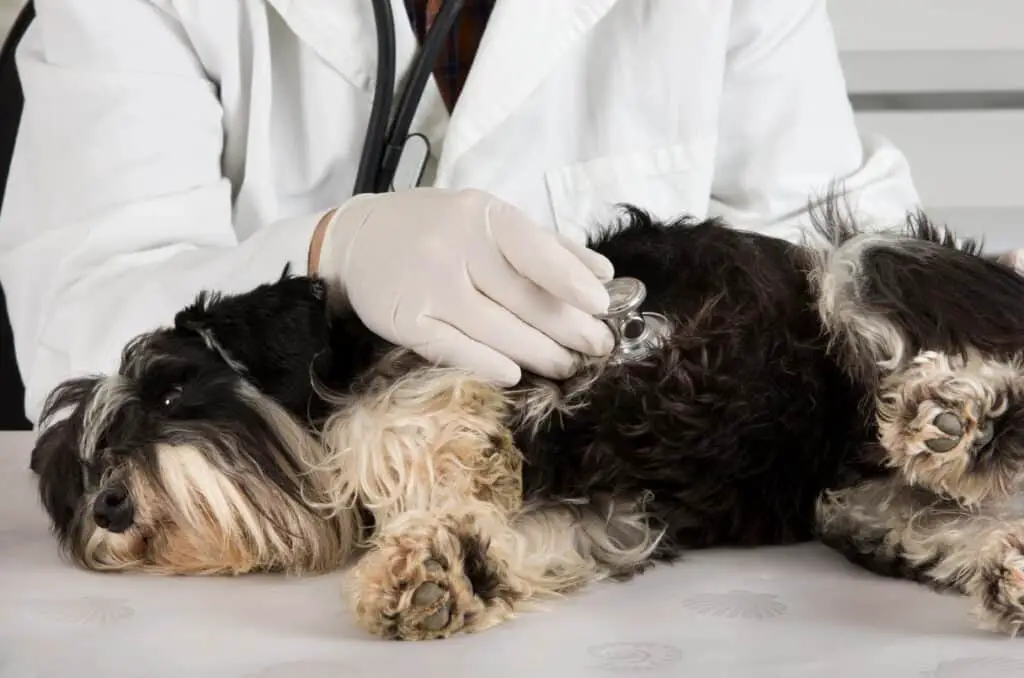
Hyperlipidemia
Hyperlipidemia, or elevated levels of fat in the blood, is a health concern that can affect Schnauzers, particularly due to their predisposition to disorders like hyperlipoproteinemia.
This breed is prone to developing elevated levels of cholesterol and triglycerides, which can lead to conditions such as pancreatitis.
Hyperlipidemia in Schnauzers may manifest as abdominal pain, vomiting, and lethargy.
Dietary management, including low-fat diets, is often a key component of treatment.
Regular veterinary check-ups, monitoring blood lipid levels, and adherence to a proper diet are crucial in managing and preventing complications associated with hyperlipidemia in Miniature Schnauzers.
Pancreatitis
Pancreatitis, inflammation of the pancreas, is a health concern that can affect Schnauzers, and they seem to be predisposed to this condition.
Pancreatitis may be triggered by dietary indiscretions, high-fat meals, or other factors.
Clinical signs include abdominal pain, vomiting, diarrhea, and lethargy.
Prompt veterinary attention is crucial for diagnosis and management, as pancreatitis can be a severe and potentially life-threatening condition.
Treatment often involves supportive care, including intravenous fluids, pain management, and dietary adjustments.
Prevention through a low-fat diet and careful monitoring of the dog’s food intake can play a crucial role in reducing the risk of pancreatitis in Miniature Schnauzers.
Diabetes mellitus
Diabetes mellitus, a metabolic disorder characterized by inadequate insulin production or utilization, is a health concern that can affect Schnauzers.
While the exact cause is not fully understood, genetic factors are believed to contribute to their predisposition.
Diabetes in Miniature Schnauzers may present with increased thirst, excessive urination, weight loss, and changes in appetite.
Proper management involves insulin therapy, dietary modifications, and regular monitoring of blood glucose levels.
Owners of Miniature Schnauzers should be vigilant for early signs of diabetes and seek veterinary attention for an accurate diagnosis and a well-rounded treatment plan to ensure their dog’s long-term health and well-being.
Regular veterinary check ups and watching your dog’s diet will help with several of these health issues. Weight gain can lead to other health issues for your dog.
Grooming Your Miniature Schnauzer
Grooming is a vital part of your Miniature Schnauzer’s health and well-being.
Ensuring that the wiry coat, distinctive mustache, and eyebrows are properly maintained will keep your dog looking their best. Here’s how to tackle each aspect of grooming.
Brushing
Begin by brushing your Schnauzer at least once a week to prevent mats and tangles, especially in their soft undercoat.
Use a slicker brush for the topcoat and a sturdy comb for the undercoat. Regular brushing helps reduce shedding and keeps the coat healthy.
Bathing
Bathing should be done every 4-6 weeks.
Before you start, make sure to brush out the coat thoroughly to avoid matting.
A gentle dog shampoo will clean the coat without stripping essential oils.
Always dry the coat well, as a damp undercoat can lead to skin issues.
This massager really gets down to your dog’s skin with the soap.
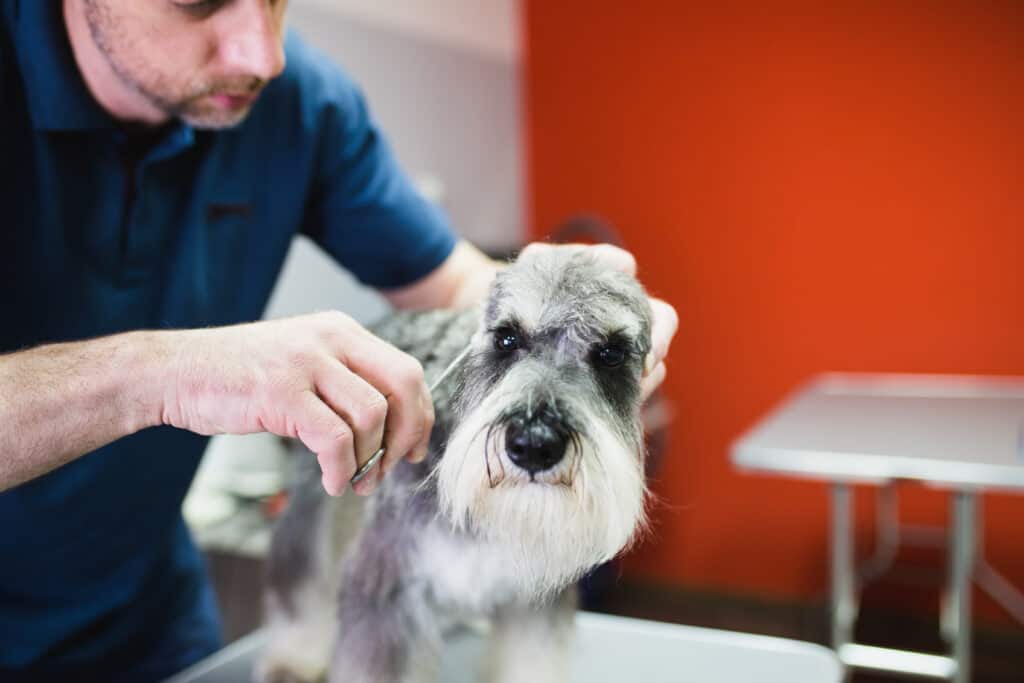
Cutting Fur/Hair
Cutting their fur requires precision.
The wiry coat of your dog should be trimmed with grooming scissors, carefully shaping the hair around the face to highlight their expressive mustache and eyebrows.
For body hair, electric clippers may be used for an even look.
Clipping or Grinding Nails
Your Miniature Schnauzer’s nails should be clipped or ground down regularly to prevent overgrowth and splintering.
If you are unfamiliar with the process, seek professional help to avoid cutting the quick, which can cause pain and bleeding.
To stop the bleeding, dip their nails in Styptic Powder.
If you still need more information see our article on How to Grind Your Dog’s Nails or How to Clip Your Dog’s Nails Safely.
Dental care
Implement dental care in your grooming routine to ensure your Miniature Schnauzer’s oral health.
Brush their teeth several times a week with dog-specific toothbrush and toothpaste to prevent tartar buildup and gum disease.
Cleaning Ears
Regularly cleaning the ears is crucial for preventing infections.
Use a gentle, vet-approved ear cleaner and a cotton ball to wipe out the ear canal.
Be careful not to insert anything deep into the ear to avoid injury.
Pet MD – Dog Ear Cleaner Wipes – Otic Cleanser for Dogs are compact and convenient.
By following these grooming guidelines, you’ll help your Schnauzer dog look and feel their best.
Owning a Miniature Schnauzer
Owning a Schnauzer means committing to the care of a spunky and friendly companion.
This breed is well-suited for families and adapts well to apartment living, but like any pet, comes with responsibilities that include financial commitments and providing a nurturing environment.
Cost of Purchase
The initial cost for a Miniature Schnauzer puppy can vary widely depending on the breeder’s reputation and the dog’s lineage.
Expect to pay anywhere from $500 to $2,500.
This purchase price often reflects the breeder’s investment in health screenings and care for the breed which is known for its wiry coat and alert presence.
Maintenance Costs
Routine expenses for maintaining include:
- Grooming: The wiry coat requires regular grooming to prevent mats and tangles. Budget for professional grooming every few months, which can cost $50 to $100 per session.
- Nutrition: A balanced diet to prevent overweight issues is crucial. High-quality dog food expenses can average $20 to $40 per month.
- Healthcare: Regular vet check-ups and vaccinations are part of responsible ownership. Set aside $200 to $600 annually, plus potential costs for addressing breed-specific health issues.
- Exercise and Mental Stimulation: Invest in toys and training for exercise and to avoid aloof behavior, which can have variable costs.
Adopting a Miniature Schnauzer
Adoption is a cost-effective and compassionate option to consider.
Adoption fees usually range from $50 to $300 and often cover initial veterinary care.
By adopting, you give a home to a pet in need and potentially protect them from being in an environment where they might chase rodents or other small animals due to their natural instincts.
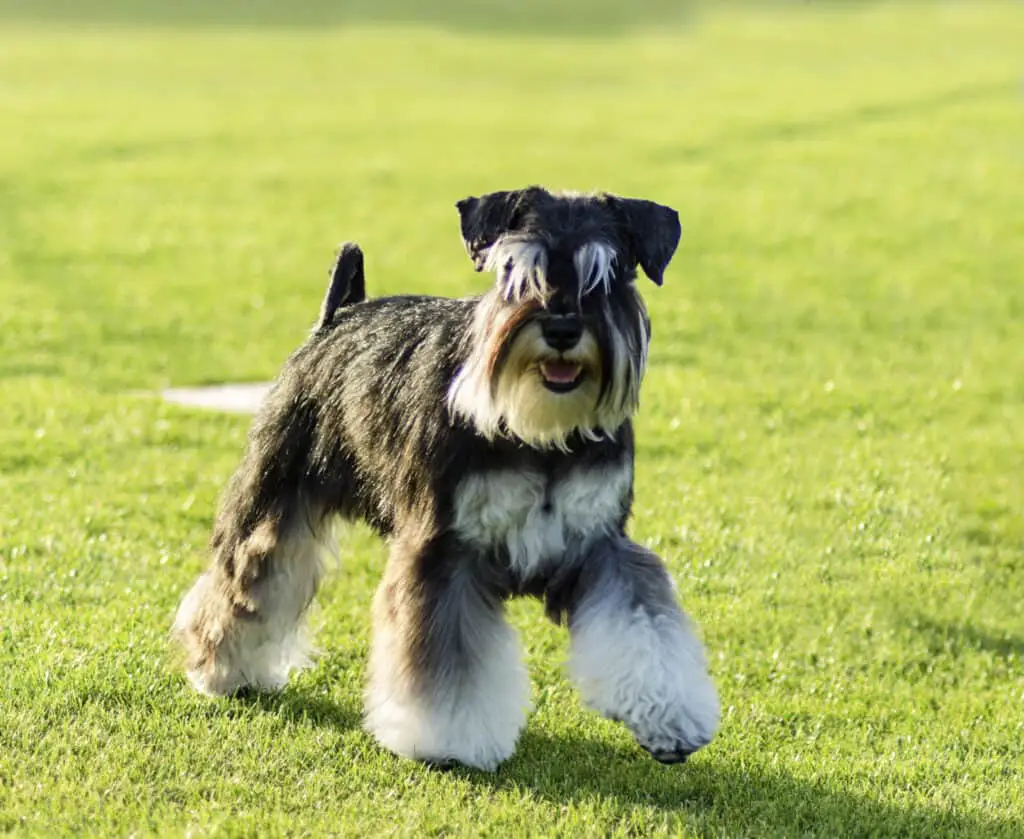
Finding Reputable Breeders
When looking to buy the right puppy, it’s essential to find a reputable breeder who provide a healthy environment for their dogs and can verify their Schnauzer’s health clearances:
- Research: Look for breeders who encourage visits to see the puppies and meet the parents.
- Questions: Ask about their breeding practices and how they prevent genetic health issues.
- Documentation: Obtain all necessary health certifications for the breed.
By considering these factors, you can ensure that your Miniature Schnauzer will be a loving member of your family for years to come.
Frequently Asked Questions
In this section, you’ll find concise answers to some of the most common inquiries about Miniature Schnauzers, empowering you with fundamental insights into the breed.
What is the typical lifespan of a Miniature Schnauzer?
Miniature Schnauzers have a lifespan of 12 to 15 years, thriving well into their teen years with proper care.
How much maintenance do Miniature Schnauzers require?
They require regular grooming; Miniature Schnauzers need frequent brushing, combing, and professional grooming due to their non-shedding coat.
Are Miniature Schnauzers prone to any behavior problems?
Like many breeds, without proper training, Miniature Schnauzers may develop behavior problems, but with consistent training, they are known to be well-behaved and obedient.
What is the average size and weight of a Miniature Schnauzer?
An adult Miniature Schnauzer typically stands about 12 to 14 inches tall at the shoulder, weighing between 15 to 20 pounds.
How much does a Miniature Schnauzer typically cost?
The price for a Miniature Schnauzer can vary widely, from around $500 to over $3,000, depending on breeder reputation, location, and pedigree.
Is excessive barking a common trait in Miniature Schnauzers?
Miniature Schnauzers can be vocal, and while not all are prone to excessive barking, it’s important to address this behavior with appropriate training if it occurs.
The Bottom Line

When considering a Schnauzer as your companion, you’re looking at a dog breed renowned for its lively and intelligent nature.
Miniature Schnauzers are compact and sturdy, making them a suitable pet for various living situations.
They have a distinctive personality that is often described as bold and vigilant, traits that serve them well in their role as watchdogs.
Key Aspects of the Miniature Schnauzer:
- Watchdogs: They are alert and will bark to notify you of strangers, yet they maintain a friendly demeanor with neighbors.
- Intelligence: Miniature Schnauzers are highly intelligent, which can make training with a leash or other commands more manageable.
- Low-Shedding: This breed is a low-shedder, making it a considerate choice for homes concerned about allergens.
- Socialization: Early socialization can enhance their kid-friendly credentials and help them to get along with other pets, like a cat.
When properly socialized, they can become an excellent family dog, blending well into the family and enjoying daily life alongside their human counterparts.
Unlike the Miniature Pinscher, which is a separate breed, Miniature Schnauzers are part of the schnauzer breeds and hold a unique charm with their pristine white or salt-and-pepper coats.
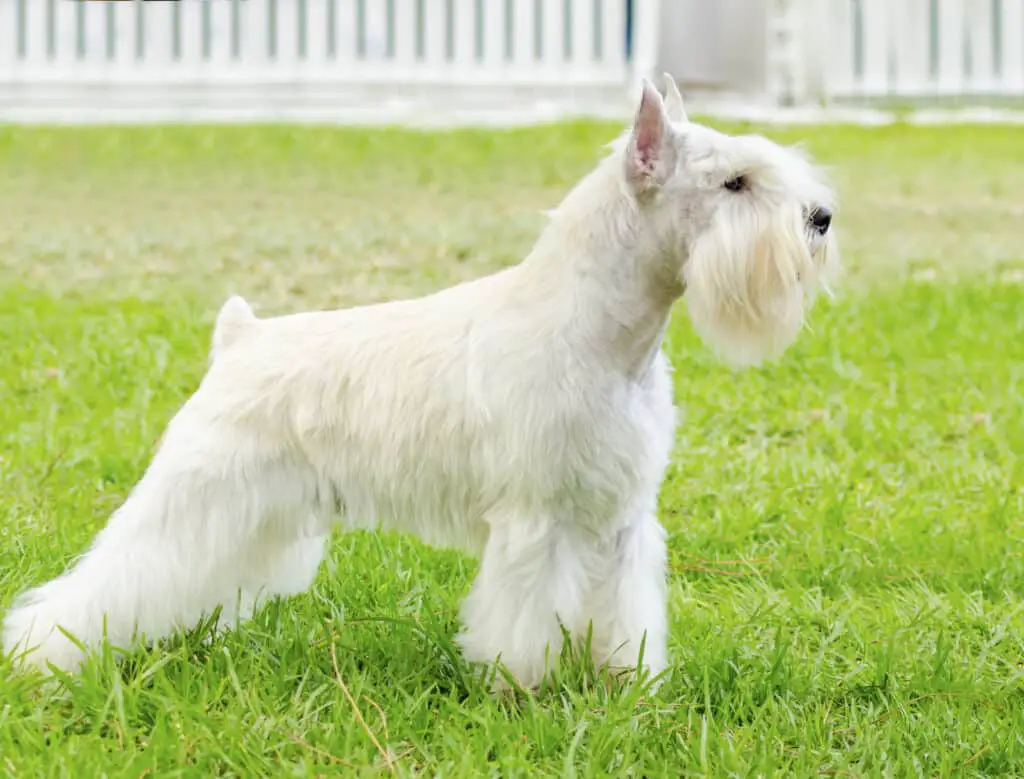
A balanced approach to socialization is also vital for ensuring your Miniature Schnauzer develops healthy relationships with friends and guests.
While they are usually unfazed by the presence of strangers, it’s essential to maintain social exposure to ensure this remains a positive experience.
In essence, your Miniature Schnauzer is more than just a pet; they’re a companion, a character full of spunk, and a lovable addition to your home.
Intelligent, kid-friendly, and cat-tolerant when properly introduced, they encapsulate the essence of what many seek in a family dog—a loyal, affectionate, and playful partner in life’s adventures.
Please read our Legal Disclaimer







